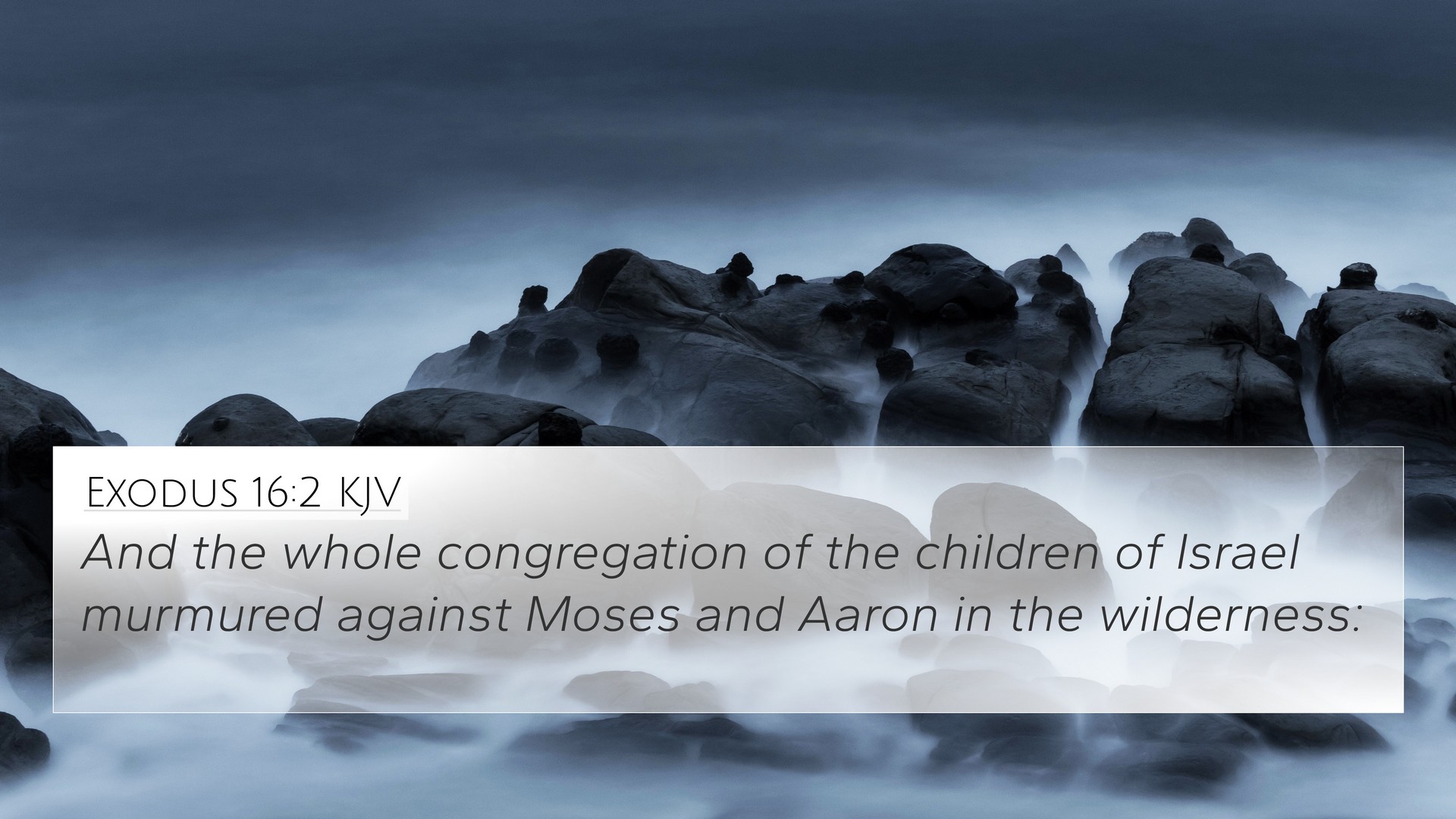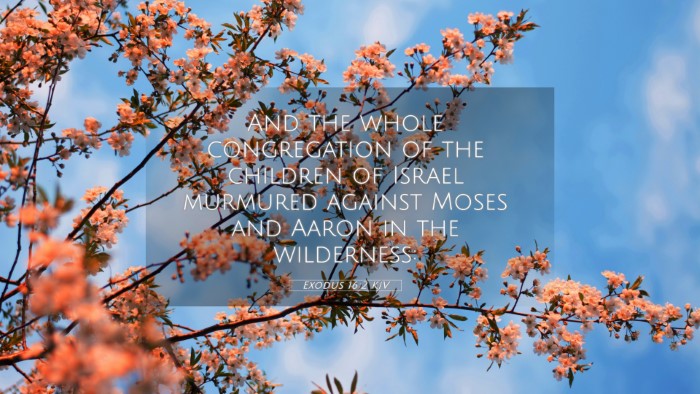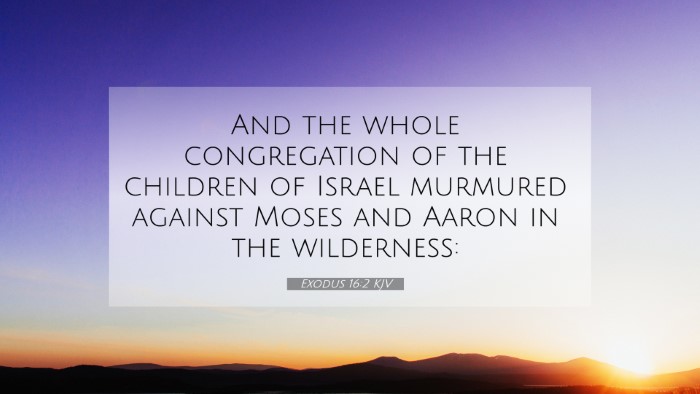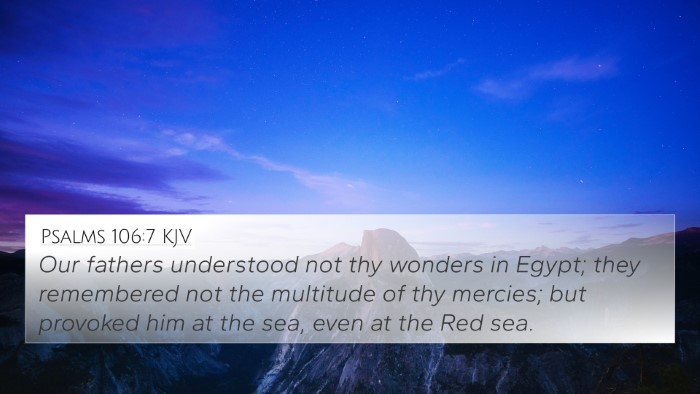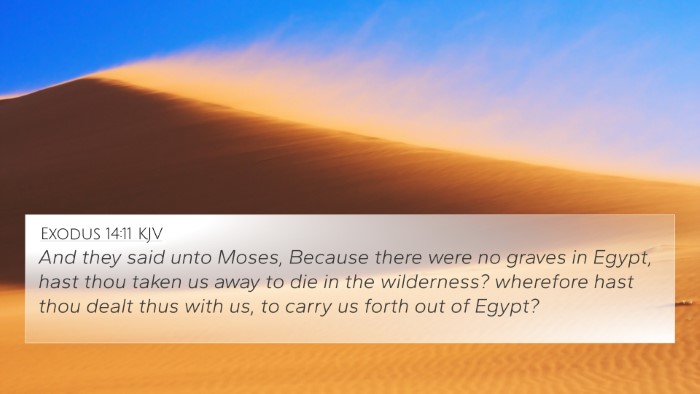Understanding Exodus 16:2
Exodus 16:2 states: "And the whole congregation of the children of Israel murmured against Moses and Aaron in the wilderness." This verse opens a profound narrative that reveals the complexities of human nature, divine provision, and communal relationships within the Israelite community during their journey in the wilderness.
Summary of Insights
The murmuring or complaining of the Israelites serves as a significant theme in Exodus 16:2, indicating not only dissatisfaction but a deeper sense of distrust towards God’s providence. This biblical account is echoed throughout scripture, reflecting the tension between divine deliverance and human discontent.
Prophetic Context and Historical Background
-
Matthew Henry's Commentary:
Henry emphasizes the Israelites' grievances against Moses and Aaron stemming from their hunger. He highlights this moment as a test of their faith, suggesting that their physical needs ignited a spiritual crisis, showcasing a lack of trust in God's plans—a recurrent issue throughout their journey.
-
Albert Barnes' Notes:
Barnes points out that murmuring against Moses and Aaron symbolizes a rebellion against God's chosen leaders. He notes the irony that despite witnessing miraculous events in Egypt and their deliverance, the people's faith wavered when faced with adversity, exemplifying the struggle between faith and circumstance.
-
Adam Clarke's Commentary:
Clarke provides an analytical approach, suggesting that the murmuring reflects a deeper longing for the comforts of Egypt, illustrating how past circumstances can influence present behavior and attitudes. He highlights the emotional and spiritual weight upon Moses and Aaron as leaders during these challenging times.
Biblical Cross-References
To fully appreciate Exodus 16:2, it's beneficial to explore bible verse cross-references that enhance our understanding of the passage's implications within the broader scriptural narrative. Below are significant connections:
- Numbers 11:1-3: This passage depicts the Israelites again complaining, showing a pattern of behavior that leads to God's anger.
- Psalm 78:18: Indicates the tendency of the people to test God while craving food.
- John 6:31: Jesus refers to the manna, reminding us of God's provision in the wilderness.
- Philippians 2:14: Advises against murmuring, reflecting a New Testament moral application of the Israelites' actions.
- Hebrews 3:16-19: Discusses the consequences of unbelief linked to the wilderness experience.
- 1 Corinthians 10:10: Paul warns against complaining, linking contemporary believers to the Israelites' experiences.
- Deuteronomy 8:2-3: Reminds the Israelites of their wandering and God's testing purpose during their journey.
Thematic Connections
The thematic connections between Exodus 16:2 and other scriptures provide invaluable insights for bible verse interpretation and cross-referencing Biblical texts. The recurring motifs of lack, complaint, and divine provision create a narrative that speaks to the human experience.
Application for Modern Readers
Today's believers can find guidance in the lessons from Exodus 16:2, recognizing how it's essential to navigate discontent and cultivate trust in God's timing and provision. This passage challenges readers to reflect on their faith during difficult times and encourages reliance on God's promises.
Conclusion
In summary, Exodus 16:2 not only highlights a pivotal moment in the Israelite journey but also serves as a reflective point for believers today on issues of faith, trust, and the consequences of complaint. By examining this verse through thematic Bible verse connections and various commentaries, individuals can deepen their understanding of God's character and His unwavering faithfulness in times of need.
